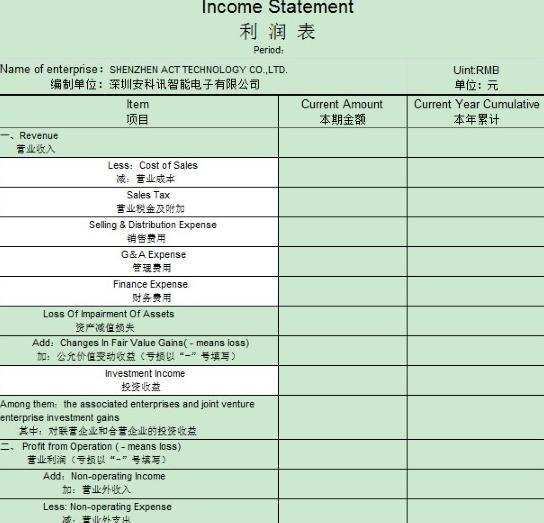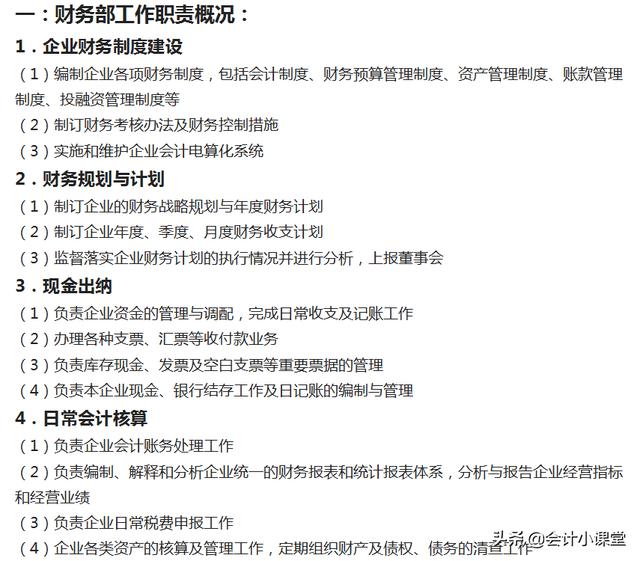摘要:本文深入概述了会计专业人员的职责。作为会计人员,他们需确保财务记录的准确性,遵守相关法规,为组织提供准确的财务数据。他们还要参与财务报告的编制,确保财务活动的合规性,并为管理层提供财务建议。他们还应保持职业道德,保护客户机密信息,不断学习和更新知识,以适应不断变化的会计领域。
In the realm of business and finance, accounting plays a pivotal role, serving as the backbone of financial decision-making and management. The responsibilities of an accountant are diverse and encompass various tasks related to financial record-keeping, analysis, and reporting. This article aims to provide an insightful overview of the accounting professional's responsibilities in an organization.
1、Financial Record-Keeping
The primary responsibility of an accountant is to maintain accurate financial records. This involves keeping track of all financial transactions within the organization, including expenses, revenues, costs, and liabilities. The accountant must ensure that these records are updated in a timely manner and comply with the organization's accounting policies and procedures. Additionally, they must ensure that these records are secure and accessible for audits or other financial reviews.
2、Financial Analysis and Reporting
Accountants are responsible for analyzing financial data and providing insights to management and stakeholders. They must analyze financial statements, identify trends, and detect any deviations from normal patterns. This analysis helps in making informed decisions about budgeting, investing, and other financial matters. Additionally, accountants prepare various reports, such as monthly, quarterly, or annual financial reports, which provide an overview of the organization's financial health and performance.
3、Compliance with Laws and Regulations
Accountants must ensure that the organization's financial transactions comply with relevant laws, regulations, and accounting standards. They must have a thorough knowledge of tax laws and ensure that taxes are calculated and paid correctly and on time. Additionally, they must adhere to Generally Accepted Accounting Principles (GAAP) and International Financial Reporting Standards (IFRS) to ensure the accuracy and reliability of financial statements.
4、Budgeting and Forecasting
Accountants play a crucial role in budgeting and forecasting. They are responsible for preparing budgets, analyzing costs, and estimating future revenues and expenses. This information helps management make informed decisions about resource allocation and strategic planning. Additionally, they monitor the organization's spending to ensure that it remains on track with the budget.
5、Audit Preparation
Accountants are responsible for preparing the organization for audits. They must ensure that financial records are organized, accurate, and complete. Additionally, they must provide necessary documents and information to auditors during the audit process. This preparation helps ensure a smooth audit process and identifies any potential issues or areas of improvement.
6、Risk Management
Accountants also play a role in risk management. They identify financial risks within the organization and assess their potential impact on the organization's financial health. Additionally, they provide recommendations to manage these risks and mitigate their impact. This proactive approach helps the organization stay ahead of potential financial crises and ensures its financial stability.
In conclusion, the responsibilities of an accountant are diverse and encompass various tasks related to financial record-keeping, analysis, reporting, compliance, budgeting, forecasting, audit preparation, and risk management. These responsibilities require a thorough knowledge of accounting principles, laws, and regulations. Accountants must possess strong analytical skills, attention to detail, and excellent communication skills to perform their duties effectively. Their contributions are crucial in ensuring the financial health and stability of an organization.




 京公网安备11000000000001号
京公网安备11000000000001号 京ICP备11000001号
京ICP备11000001号